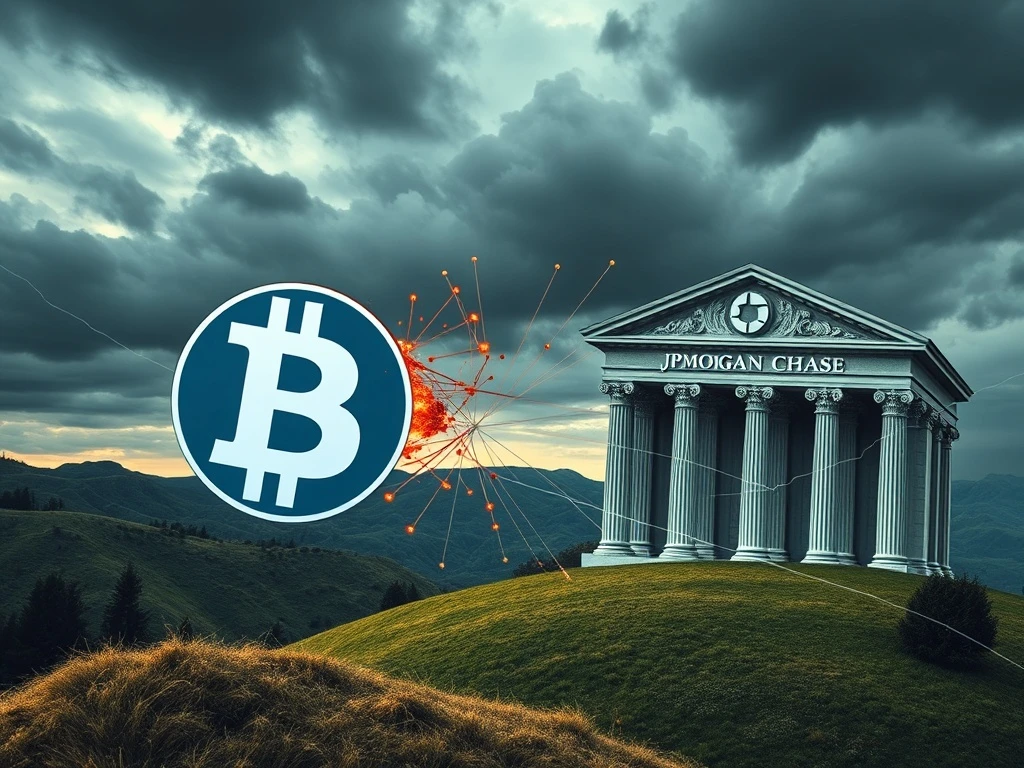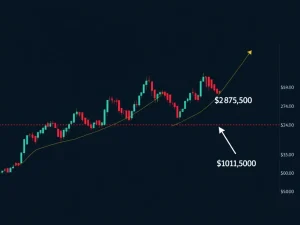Urgent Bitcoin News: Winklevoss Accuses JPMorgan of Halting Gemini Onboarding Amid Open Banking Clash

The world of digital finance is rarely dull, and the latest Bitcoin News has certainly grabbed headlines. In a stunning development, Tyler Winklevoss, co-founder of the prominent cryptocurrency exchange Gemini, has publicly accused banking giant JPMorgan Chase of retaliating against his firm. The alleged ‘punishment’? Halting Gemini’s re-onboarding process. This dramatic accusation stems from Winklevoss’s vocal criticism of JPMorgan’s controversial new data access policies, sparking a heated debate that highlights the ongoing tension between traditional finance and the burgeoning crypto industry.
JPMorgan’s Data Policies Under Fire: What’s the Real Issue?
At the heart of this dispute are JPMorgan’s recent decisions regarding customer banking data access. Tyler Winklevoss claims that JPMorgan is attempting to charge financial technology (fintech) firms for access to customer banking data, a move he labels as anti-competitive and detrimental to the broader digital economy. This isn’t just about a fee; it’s about control over information that fuels innovation in fintech, including crucial links to the crypto industry.
Proposed Fees: JPMorgan is reportedly pushing for higher fees on third-party fintech platforms, such as Plaid, which are essential for facilitating data sharing between banks and various applications, including crypto exchanges.
Anti-Competitive Practices: Winklevoss argues these fees would ‘bankrupt fintechs’ and severely limit consumer access to cryptocurrency services, directly implicating JPMorgan CEO Jamie Dimon as a central figure in this conflict.
CFPB Rule 1033: The conflict is further complicated by JPMorgan’s alleged efforts to undermine a Consumer Financial Protection Bureau (CFPB) rule under Section 1033. This rule mandates free data sharing between banks and third-party services, aiming to promote open banking and consumer choice.
The Gemini Perspective: A History of Banking Challenges
For Gemini, this isn’t their first rodeo with traditional financial institutions. Winklevoss has framed JPMorgan’s actions as part of an ‘Operation ChokePoint 2.0’ strategy. This term references historical attempts by financial institutions and regulators to sever ties with crypto businesses, effectively ‘de-banking’ them. He specifically cited Gemini’s 2023 experience, when JPMorgan allegedly pressured the exchange to find a new banking partner, though Gemini had previously denied any disruption to their relationship at the time.
The recent pause in Gemini’s re-onboarding process, following Winklevoss’s public critique, strongly suggests a pattern of institutional resistance. This incident underscores the challenges crypto firms continue to face in securing stable, long-term banking partnerships, a critical component for their operational viability and growth.
Why Open Banking Matters for the Crypto Industry
The concept of Open Banking is foundational to the modern financial landscape, enabling consumers to securely share their financial data with third-party applications. For the Crypto Industry, this data flow is vital. It allows users to seamlessly link their traditional bank accounts to crypto platforms, facilitating deposits, withdrawals, and overall access to digital assets. Without robust and free data sharing, the integration of crypto into mainstream finance becomes significantly more difficult.
Critics argue that large banks, like JPMorgan, are leveraging their market influence to maintain dominance over data access. By imposing fees or restricting data flow, they can create barriers to entry for smaller fintechs and crypto companies, potentially stifling innovation and limiting consumer choice. The outcome of the legal challenges to the CFPB’s Section 1033 rule will undoubtedly shape the future of financial data access in the U.S., determining whether consumers retain free control over their data or face paywalls imposed by financial institutions.
Political Undercurrents and the Future of Crypto
The dispute between Winklevoss and JPMorgan also carries notable political undertones. Tyler Winklevoss highlighted that the bank’s actions contradict Donald Trump’s stated pro-crypto agenda, which aims to position the U.S. as a global leader in digital assets. The Winklevoss twins have been public supporters of Trump’s campaigns, making their critique of a major U.S. bank particularly salient in the current political climate.
This incident reflects a broader struggle over the balance of power within the financial system. As regulatory frameworks for digital assets continue to evolve, the ability of crypto firms to secure reliable banking services remains a key hurdle. The allegations against JPMorgan add to a growing narrative that some traditional banks are selectively restricting access to services for crypto businesses, raising serious questions about fair competition and consumer rights in an increasingly digital world.
Gemini’s Strategic Ambitions Amidst Banking Hurdles
Despite these ongoing banking challenges, Gemini is clearly pushing forward with ambitious plans. The exchange’s recent filing for an initial public offering (IPO) with the SEC underscores its strategic drive to expand its market presence and solidify its position in the competitive crypto landscape. This move signals Gemini’s long-term vision, even as it navigates complex relationships with traditional financial gatekeepers like JPMorgan.
The incident with JPMorgan serves as a stark reminder of the inherent tensions between the established financial order and the disruptive force of cryptocurrency. While traditional institutions often voice concerns about the risks associated with digital assets, critics argue that their actions sometimes border on anti-competitive behavior, aiming to protect their existing dominance rather than fostering an open and innovative financial ecosystem.
A Critical Juncture for Open Banking and Crypto
The silence from JPMorgan regarding these serious allegations leaves the dispute in a legal and regulatory limbo. The outcome of this high-profile conflict, alongside the ongoing legal challenges to open banking rules, will have profound implications for the future of financial services in the U.S. It will shape whether consumers truly own their financial data and can seamlessly connect their traditional accounts to innovative crypto platforms, or if they will face increasing hurdles and costs.
Industry observers are closely watching this space, as the ability of crypto firms to secure traditional banking partnerships remains a cornerstone of their growth and mainstream adoption. The Gemini-JPMorgan rift is more than just a corporate spat; it’s a microcosm of the larger battle for control and access in the evolving financial system, with open banking rules at the very center of the debate. As innovation accelerates, the need for clear, fair, and pro-consumer regulations becomes ever more critical.
Frequently Asked Questions (FAQs)
Q1: What is the core accusation Tyler Winklevoss made against JPMorgan?
A1: Tyler Winklevoss accused JPMorgan Chase of halting Gemini’s re-onboarding process in retaliation for his public criticism of the bank’s new data access policies, specifically their decision to charge fintech firms for customer banking data.
Q2: What is ‘Open Banking’ and why is it important for the Crypto Industry?
A2: Open Banking is a system that allows third-party financial service providers to access consumer banking data (with consent) through APIs. For the Crypto Industry, it’s crucial as it enables seamless connectivity between traditional bank accounts and crypto platforms, facilitating transactions and user access to digital assets.
Q3: What is ‘Operation ChokePoint 2.0’ and how does it relate to this incident?
A3: ‘Operation ChokePoint 2.0’ is a term used by crypto advocates to describe alleged efforts by traditional financial institutions to ‘de-bank’ or sever ties with crypto businesses. Winklevoss invoked this term to suggest JPMorgan’s actions are part of a broader pattern of restricting access for crypto firms.
Q4: How does the CFPB’s Section 1033 rule factor into this dispute?
A4: The CFPB’s Section 1033 rule mandates free data sharing between banks and third-party services. JPMorgan is reportedly attempting to weaken this rule, which Winklevoss argues would lead to paywalls for data access, harming fintechs and crypto services.
Q5: What are the broader implications of this conflict for consumers?
A5: The outcome of this dispute and the ongoing debate over open banking rules could determine whether consumers continue to have free and easy access to their own financial data, or if they will face new fees and restrictions when trying to connect their bank accounts to various fintech and crypto applications.










